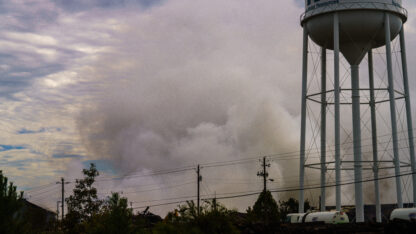Georgia Power has found evidence that chemicals have leaked into groundwater at three of its coal-fired power plants. The utility found arsenic at plants near Rome and on the Savannah River, and it found beryllium and selenium at a plant near Newnan.
The results are from a groundwater monitoring program required by federal coal ash rules. Georgia Power installed more than 130 groundwater monitoring wells at six different power plants. Four of the monitoring wells – one each at Plant Hammond and Plant McIntosh, and two at Plant Yates – showed levels of contaminants that exceed state standards.
Aaron Mitchell, Georgia Power’s general manager of environmental affairs, said the next step is to figure out where the contaminants came from.
“We’re investigating other sources of the arsenic,” he said. “Those wells are located at the ash pond, but also directly adjacent to substations where historically we have or may have used an herbicide that contained arsenic.”
Mitchell said none of the contaminants leaked off of the plants’ property or got into deeper aquifers.
Christopher Bowers, an attorney at the Southern Environmental Law Center agreed that it is too soon to say where the contaminants came from. But, he said, it is possible that the arsenic, beryllium and selenium could have come from the coal ash ponds.
“All of those are – and have been – associated with coal ash,” Bowers said.
Utilities have been allowed to store coal ash in large, open ponds. The U.S. Environmental Protection Agency is rolling out rules that require power companies to store coal ash more securely. Georgia’s Environmental Protection Division (EPD) is working on its own coal ash storage rules, as well.
“These things have been sitting there in a wet environment for many years, with no consistent monitoring of these unlined ponds,” said Jeff Cown, chief of the EPD’s land protection branch. He said the EPD’s rules could also require groundwater monitoring at inactive coal ash storage facilities – not just the ponds that are currently in use.
“Putting in groundwater monitoring is telling us what’s going on,” he said. “So I think the process is working.”
Georgia Power is planning to stop adding coal ash to its 29 ponds within the next three years, and to eventually close them all.
It will continue groundwater monitoring at the six plants where it has already installed wells. That includes at one of the largest coal-fired power plants in the country, Plant Scherer, near Macon. Communities near Scherer have expressed concern in the past about the coal ash ponds, but this round of testing did not find groundwater contamination at that plant.
The EPA requires a total of eight rounds of groundwater testing by October 2017.
Georgia Power has not yet tested groundwater at all of its coal ash ponds. It is installing wells at the remaining ones, including Plant McDonough, near Smyrna.
Bowers, with the Southern Environmental Law Center, said these initial tests are an important first step.
“We for years did not treat these wastes as potential sources of pollution, and now we know better,” said Bowers.









